Legal limbo police beatings of migrants facing Balkans' hell
Amnesty Int. report reveals brutality along Balkan route
07 July, 20:08by Stefano Giantin
(ANSA) - TRIESTE - While the Mediterranean route, full of pitfalls, dangerous, often deadly, is becoming less popular, the Balkan route is becoming the preferred way to enter the EU. But a common thread binds them. Both are a 'purgatory' for migrants and refugees.
The so-called 'Balkan route', is an obstacle - just like the Mediterranean one - to those who try to reach the EU from the Middle East and Africa. This was confirmed by a devastating report issued today by Amnesty International (AI), entitled 'The borderlands of Europe: violations against migrants and refugees in Macedonia, Serbia and Hungary', completed after four investigative missions in the three countries between July 2014 and March 2015.
Three countries - the last one is already an EU member and the other two are aiming at EU accession, which is still far on the horizon - turned out to be appalling, according to the report of the NGO that campaigns for human rights. AI reported that ''thousands of refugees, asylum seekers and migrants, including children, who face dangerous journeys through the Balkans, suffer violent abuse and extortion at the hands of local authorities and criminal gangs''. And these people are ''shamefully abandoned by a broken system of asylum, which leaves them trapped and with no protection in Serbia and Macedonia''.
Serbia and Macedonia, in fact, have become a sort of 'limbo' for the refugees and migrants that nobody seems willing to accept in the European Union'', said Gauri van Gulik, 'number two' of Amnesty International in Europe and Central Asia.
His words are confirmed by many stories told by the migrants interviewed by AI, all similar to one another. The sad migrant's vicissitude begins with his fleeing his or her homeland, broken down by war or economic crisis. Paying a lot of money, migrants and refugees succeed in landing on some Greek island, where they meet ''bad reception conditions'', and most of them then head to Athens before trying to cross the border with Macedonia.
Right there, on the Greek-Macedonian border (but the same happens on the Macedonian-Serbian border), ''refugees and migrants are subject to routine illegal refoulement and ill-treatment by border police''. ''Many of them - Amnesty continues - are forced to pay bribes. A witness reported that he was threatened to be refouled by the Serbian police near the Hungarian border, unless all the members of his group paid a hundred euro each''.
An Afghan refugee's story is even worse: he was refouled to Greece by Macedonian cops: ''I have seen other men who were abused; I was beaten and my 13 year old son, too''. A five months pregnant woman was attacked by Serbian police near the border with Hungary.
Moreover, according to Amnesty, ''many refugees and migrants are being arbitrarily detained by the locale authorities. Hundreds, including families, pregnant women and unaccompanied children, are kept for long periods in the Macedonian centre for foreigners named Gazi Baba, without proper legal representation and without being granted even the possibility of requesting asylum''.
This detention, ''months in inhumane and degrading conditions'', often include acts of violence committed by jail guards, established by Macedonian authorities in order to 'use' migrants as ''witnesses in criminal proceedings against traffickers'' of human beings. These violent acts, however, remain inside Gazi Baba: ''If you die here, no one will come and ask about you, we will get rid of your body'', a Macedonian policeman told a Syrian man, according to AI.
In terms of asylum, Belgrade and Skopje got even worse marks.
According to AI, in 2014 only 10 asylum applications were granted in Macedonia, only one in Serbia. Therefore, discouraged by very slow procedures in the two Balkan countries, migrants and refugees are moving northwards, towards Hungary.
And in this country, unfortunately, they ''suffer further human right violations'', Amnesty certified. Who is identified by the Magyar police is jailed, ''often in overcrowded prisons and in terrible conditions, or ill-treated by the police''. In 2014, the international NGO underlined, only 240 people have been given the right of asylum in Hungary, ''a very small percentage of the overall number of requests''. And in Hungary most of the migrants and refugees are subsequently released from detention centres. Who is expected to flee the country remains in the centres, who does not want to seek asylum in Budapest - many of them want to seek asylum in other European countries, such as Germany, Austria, Sweden - is generally deported to Serbia and, in some cases, to Macedonia.
Anyway, heaping all the blame on Budapest, Belgrade and Skopje would be unfair, Amnesty International admitted. The main responsibility for this complex issue should be attributed to the ''failure of migration policy and asylum policy within the EU, issues on which Serbia and Macedonia have no influence at all. ''Ascribing the responsibility for the asylum application process to the first EU country the migrants entered - Amnesty International remarked - is causing unsustainable pressures on the countries at the far edge of the EU and on the neighbouring states''.
It's difficult, at the present time, to find a final and functional solution. But Brussels - AI suggested - should at least understand that an heavy investment in the strengthening of control systems along the EU border is not giving good results. Instead, the priority should be to improve asylum systems in all the countries along the 'Balkan route', which today have become ''no man's land'', where refugees and migrants fleeing war remain trapped. (ANSA).














